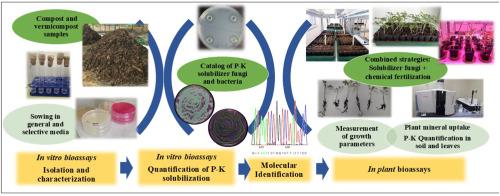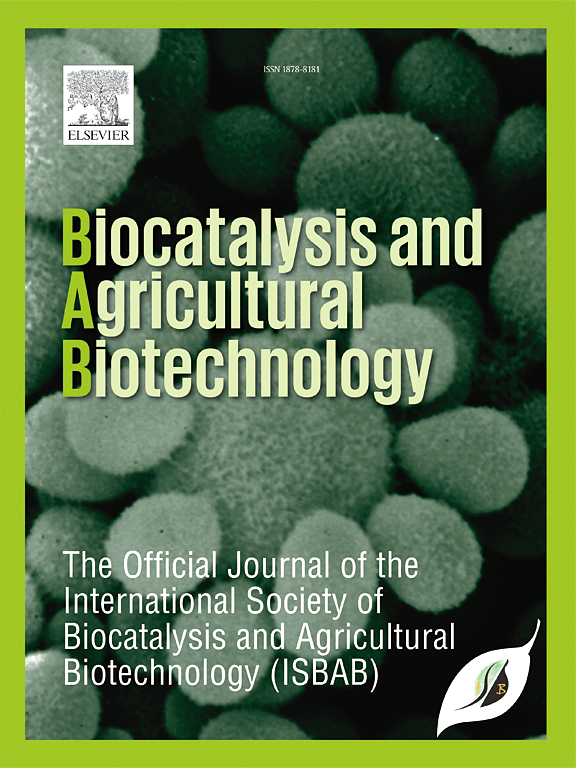通过堆肥和蚯蚓堆肥中溶磷和溶钾真菌的应用促进植物福利和根际健康
IF 3.8
Q2 BIOTECHNOLOGY & APPLIED MICROBIOLOGY
引用次数: 0
摘要
农用化学品的过度使用导致土壤养分枯竭和微生物多样性丧失,威胁到作物的可持续生产。作为一种可持续和环境友好的替代方案,植物生长促进微生物(PGPMs)的使用可以提高养分吸收和作物的整体健康。特别是磷(P)和钾(K)是对作物生长发育起重要作用的必需常量营养素。鉴于某些微生物可以通过溶解它们的不溶性形式来提高这些营养物质的可用性,从堆肥和蚯蚓堆肥中探索有益微生物提出了一个有前途的可持续策略。因此,本研究的主要目的是从堆肥和蚯蚓堆肥样品中分离出磷酸盐和钾动员微生物,并评估它们与富磷钾肥农药的组合施用,以优化番茄植株发育早期的营养吸收。从堆肥中分离到形态各异的微生物菌群50株,其中溶磷菌36株(真菌2株,细菌34株),溶钾菌14株(真菌3株,细菌11株)。鉴定出体外增溶能力最强的菌株,并对其进行了促苗试验。此外,还评估了不同生物施肥策略对幼苗磷钾吸收的影响。对植物基本生长参数改善效果最显著的真菌菌株是青霉菌(Penicillium chrysogenum PH2, P增溶剂)和星曲霉(Aspergillus costaricensis KH2, K增溶剂)。此外,发现联合施肥策略提高了根际养分吸收和可溶性微生物群落的丰度。本文章由计算机程序翻译,如有差异,请以英文原文为准。

Boosting plant welfare and rhizospheric health through the application of phosphorus and potassium-solubilizing fungi from compost and vermicompost
The overuse of agrochemicals has led to soil nutrient depletion and loss of microbial diversity, threatening sustainable crop production. As a sustainable and environmentally friendly alternative, the use of plant growth-promoting microorganisms (PGPMs) can enhance nutrient uptake and overall crop health. In particular, phosphorus (P) and potassium (K) are essential macronutrients that significantly contribute to crop growth and development. Given that certain microorganisms can enhance the availability of these nutrients by solubilizing their insoluble forms, exploring beneficial microbes from compost and vermicompost presents a promising sustainable strategy. Therefore, the main objective of this work was to isolate phosphate- and potassium-mobilizing microorganisms from compost and vermicompost samples and to evaluate their combined application with P-K rich agrochemicals in order to optimize nutrient assimilation during the early developmental stages of tomato plants. A total of 50 morphologically distinct microbial strains were isolated from the composts, including 36 P-solubilizing strains (2 fungi and 34 bacteria) and 14 K-solubilizing strains (3 fungi and 11 bacteria). The strains that showed the highest in vitro solubilization capacity were identified and tested as plant promoting agents in tomato seedlings. In addition, the P-K uptake by seedlings was evaluated as a function of different biofertilization strategies. The fungal strains tested, Penicillium chrysogenum PH2 (P solubilizer) and Aspergillus costaricensis KH2 (K solubilizer), showed the most notable beneficial effect on the improvement of basic plant growth parameters. Moreover, the combined fertilization strategy was found to improve nutrient uptake and the abundance of solubilizing microbial communities present in the rhizosphere.
求助全文
通过发布文献求助,成功后即可免费获取论文全文。
去求助
来源期刊

Biocatalysis and agricultural biotechnology
Agricultural and Biological Sciences-Agronomy and Crop Science
CiteScore
7.70
自引率
2.50%
发文量
308
审稿时长
48 days
期刊介绍:
Biocatalysis and Agricultural Biotechnology is the official journal of the International Society of Biocatalysis and Agricultural Biotechnology (ISBAB). The journal publishes high quality articles especially in the science and technology of biocatalysis, bioprocesses, agricultural biotechnology, biomedical biotechnology, and, if appropriate, from other related areas of biotechnology. The journal will publish peer-reviewed basic and applied research papers, authoritative reviews, and feature articles. The scope of the journal encompasses the research, industrial, and commercial aspects of biotechnology, including the areas of: biocatalysis; bioprocesses; food and agriculture; genetic engineering; molecular biology; healthcare and pharmaceuticals; biofuels; genomics; nanotechnology; environment and biodiversity; and bioremediation.
 求助内容:
求助内容: 应助结果提醒方式:
应助结果提醒方式:


